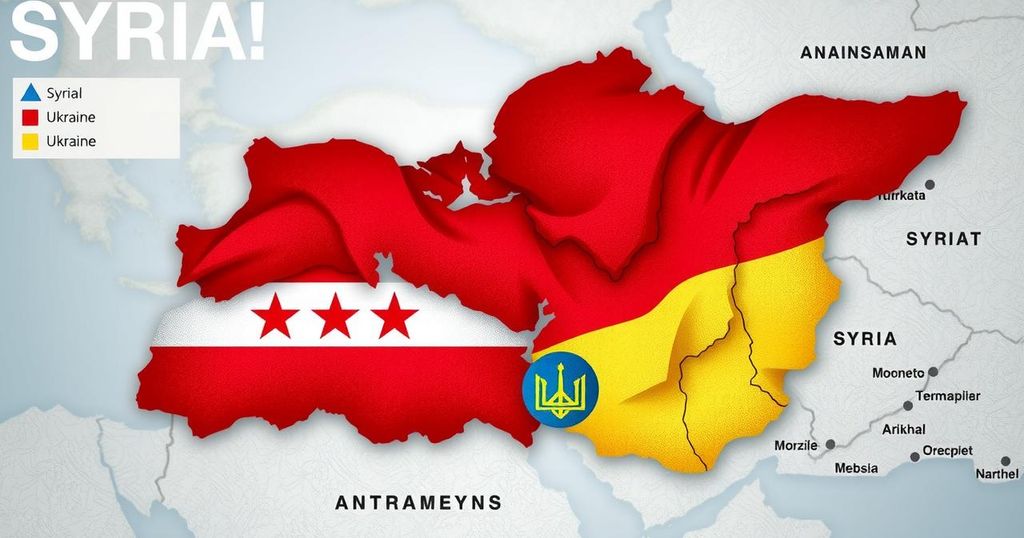Ukraine Pledges Support for New Syrian Government Amid Regional Changes

Ukraine is providing support for Syria’s new government following the ouster of Bashar Assad, marking a shift in alliances in the region. Ongoing violence between loyalists and the new authority persists amid a humanitarian crisis exacerbated by Israel’s military actions in Gaza. Meanwhile, Syria’s economy sees the appointment of its first female Central Bank governor and Turkish plans for electricity exports to alleviate shortages, illustrating regional support and cooperation amid political changes.
On December 30, 2024, Ukraine reaffirmed its commitment to assisting the newly established Syrian government, which emerged following the ousting of President Bashar Assad, historically a close ally of Russia. During a visit to Damascus, Ukrainian Foreign Minister Andrii Sybiha met with Syria’s interim leader, Ahmad al-Sharaa, advocating for a collaborative approach to create a stable and democratic Syria. Sybiha asserted Ukraine’s readiness to offer support in the areas of international law and accountability for war crimes, reflecting the shared aspirations of both nations for a better future.
In light of ongoing unrest, Syrian authorities conducted a crackdown on remaining loyalist militias in locations such as Adra, resulting in several arrests. Clashes between supporters of the old regime and the newly formed leadership have led to violence and several fatalities, predominantly among the Alawite community. This underscores the turbulence within Syria as the population grapples with the consequences of a decade-long civil conflict and seeks to establish new governance.
Simultaneously, the humanitarian crisis continues to deepen across the region, particularly in Gaza. An alarming report highlighted the obliteration of the healthcare system in northern Gaza due to Israel’s military actions, with hospitals rendered inoperable. Authorities in Gaza have expressed grave concerns regarding the treatment of medical staff, including the detention of Dr. Hussam Abu Safiya under contentious circumstances, prompting calls from his family for intervention by international bodies.
Moreover, on the economic front, Syria’s new administration undertook significant appointments, including naming Maysaa Sabreen as the first female interim Central Bank governor. This decision marks a progressive step for the country as it endeavors to revitalize its economy amid widespread poverty and societal challenges post-Assad. In a related development, Turkish officials indicated readiness to aid Syria and Lebanon by exporting electricity to combat severe power shortages, showcasing a potential avenue for regional cooperation.
As Ukraine continues to facilitate support for the new Syria and collaborations advance with Turkey on energy needs, the landscape of Middle Eastern geopolitics and humanitarian concerns remains fraught with complexities and evolving dynamics.
In recent months, Syria’s political landscape has undergone significant shifts following the ousting of President Bashar Assad, a critical ally of Russia during his regime. This transformation has prompted a reassessment of relationships in the region, particularly as the new government seeks to distance itself from previous alliances, particularly with Iran and Russia. Ukraine’s involvement symbolizes a strategic pivot as it pledges assistance to help establish a more stable governance framework in Syria, aligning with the aspirations of many Syrians who have suffered under decades of dictatorship. Simultaneously, humanitarian crises in Gaza necessitate urgent international attention, complicating the geopolitical climate further and highlighting the extensive repercussions of ongoing conflicts in the Middle East.
In summary, Ukraine’s pledge of support for the new Syrian government represents a significant development in the region’s geopolitics, coupled with ongoing efforts to ensure stability and adhere to international laws. The twin challenges of rebuilding trust among communities within Syria and addressing the humanitarian crises in neighboring Gaza reflect the deeply intertwined nature of these regional dynamics. The appointment of key positions within Syria’s economic framework and international collaborations, particularly with Turkey, indicate a concerted effort to overcome the legacies of a damaging civil war while striving for recovery and progress.
Original Source: apnews.com







